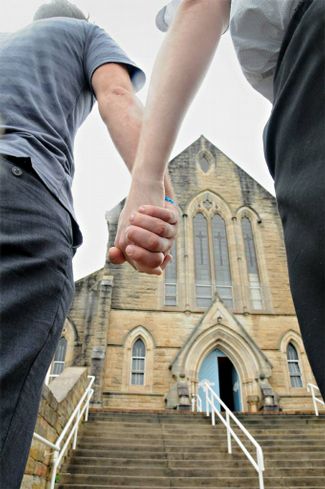In November 2010 the Australian centre for Sex. Health and Socuety released its third Writing Themselves In Report, looking at the experiences of same-sex attracted and gender questioning young Australians.
The report found that marriage equality is important to many young SSAGQ young people, particularly those from more conservative and religious backgrounds. An extract from the report is quoted below. For the full report, click here
***
An extract from the Writing Themselves In Report, November 2010
Marriage and children
Getting married and raising children is often the bedrock of religious belief. The growing debate around same sex marriage and gay parenting appears to have a special meaning for the SSAGQ young people who mentioned religion. It provides religious SSAGQ young people with a future of connectivity with the once out of reach religious institutions of family and marriage. Lindsay showed a tenacious spirit, and wrote of one day being married in the eyes of her god:
“I don’t know what the future holds, but I am going to keep on going, love myself, and love my God…I will be married in the eyes of God, no matter what the government or the Church try to say.” (Lindsay, 18 years)
Likewise, getting married and having children was so important to Mary that she planned to leave Australia to achieve her dream:
“At the moment I am engaged to my long-time friend of 5 years who I began dating last year. We plan to live in Canada in the future to marry and raise a family through IVF.” (Mary, 18 years)
SSAGQ young people are increasingly seeing marriage and children as possibilities in their lives, and this is providing those who mention religioned with the ability to live closer to the religious ideals they grew up with. The recent discourse of same sex marriage and gay parenting is helping some young people to resist homophobic religious messages, and is ultimately helping some to maintain their faith.
There is no doubt that, for the majority of those who mentioned religion, it has been a negative and damaging influence from which they feel the need to escape in order to preserve their health and wellbeing. For many who make this shift it is literally depicted as a choice between life and death when there appears to be no way forward for them within the church. It is a distressing thing to see young people who are committed to a religious faith and who have much to give to that community of religion being driven away by homonegativity. Churches are certainly the poorer for the loss of these young people.
Nevertheless, it is clear that a small social shift is occurring within this layer of influence. Some young people are searching out homopositive religious organizations, reframing and ignoring homonegative messages, while others have been fortunate to grow up within religions that are now fully accepting of LGBT people. While young people are continually describing religion as out of step with their personal beliefs, they are increasingly willing to remain within it and advocate for change. Just like the movement against prohibition of female clergy in the past, or the churches support for slavery, some young religious SSAGQ youth in Australia today, appear to be heading towards a new era of LGBTI affirming religion.

